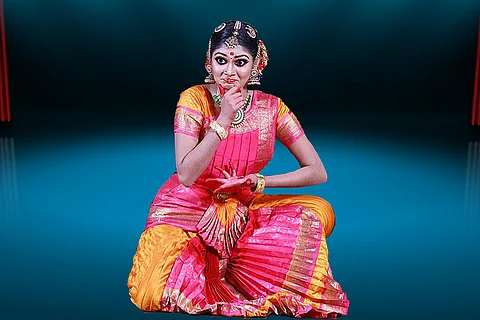

Receiving praises is not something Mansiya is accustomed to. For, when the 22-year-old from Kerala's Malappuram district excelled time and again in classical dance forms, she has seen her classmates, teachers, and the community members turn their heads the other way.
Born into a Muslim family in Velluvampuram in Malappuram, Manisya and her 27-year-old sister Rubiya has only faced exclusion from most of the community members, for the two learned and performed "Hindu dance forms."
"Never in our lives have any of our teachers at school or any others from the community praised us for our achievements. I remember how teachers at school would congratulate a student who came third in the dance competition, but walk away without even glancing at me, who secured the first place," Mansiya tells The News Minute.
Years of dedicated learning is paying off, for Mansiya would join for MPhil in the prestigious Kerala Kalamandalam in June this year, after recently bagging the first rank for MA in Bharatnatyam from the University of Madras.
The sisters started training in Bharatnatyam from the young age of three, and while Rubiya went on to become a dance teacher, Mansiya looks forward to setting up a dance school. However, even as she basks in the glory of having topped her university, Mansiya looks back at those times when her family faced ostracisation from their community members.
The many episodes of social ostracisation is still clear in Mansiya's mind. But it is one incident that gives the 22-year-old jitters as she recollects it.
"My elder sister was in the 4th std then. One day, the Ustad (teacher) at the madrassa asked her to climb on top of the bench and asked her to perform her Hindu dance, with such disgust. This was possibly the first time we realised that we were being shunted by the community members. I was too young to realise why people were treating us so, but then gradually I began to make sense of it all," Mansiya says.
Over the years, the sister-duo has learned Bharatnatyam, Kuchipudi, Mohiniyattam, Kerala Nadanam and Kathakali. Mansiya had secured first prize in the Kerala School Kalolsavam continuously from 8th std to 12th standard.
The tale of two Muslim sisters
It was 61-year-old Alivikutty and his wife Amina, who encouraged their two girl children to learn classical dance. While Amina succumbed to cancer a couple of years ago, Alivikutty continues to be the pillar that keeps them motivated.
"My umma (mother) had only studied till 4th standard and one day, she saw a classical dance performance on TV. She didn't know what it was, but she was fascinated by the colourful costumes the performers wore and was in awe of their graceful movements. Umma then took my sister Rubiya, who was only three years old then, to a dance teacher in Manjeri. When I turned three, I was also taken to the same teacher," Mansiya remembers.
However, the family began to realise that they were being ostracised by the community members. Though not explicitly at the beginning, the community members would ignore them for not wearing a burkha and performing Hindu dance forms on stage. Alivikutty was a theatre artist during his youth, and this was an another for the community members to despise them.
"Religion is no barrier to learning any dance form and what our parents taught us was that all religions are the same. We were not sent to madrassa for any religious studies, but to get a perspective of what Quran says. At home, we had already read Hindu and Christian religious texts. At the madrassa, my sister and I would at times contradict the ustad and question their reading of the Quran. This only worsened their attitude towards us. After some years, we quit going to the madrassa," Mansiya says.
Mother's death
Mansiya's mother Amina's death is something that she hasn't come to terms with yet. When Amina succumbed to cancer, community members refused to bury her at the mosque, citing that they were not included in Mahal. Mahal, Mansiya explains, is a community of Muslims. Only people who are part of Mahal are included in community matters.
And for Amina to be buried in the mosque cemetery, the family had to be included in Mahal, which they were not.
It was when the family wanted to avail financial aid for Amina's treatment, that the family realised to their horror, that they were being kept away from Mahal, and therefore, the financial aid was refused to them.
Mansiya, who remembers her mother as a religious woman, says, "Umma was highly religious, and was upset that our family was not part of Mahal. However, she never once asked us to stop dancing because of the social pressure."
There were people who told her that her mother would go to hell if she did not stop dancing. There were people who propagated rumours targeted at Mansiya's character in her school days. There were people who made no efforts to hide their anger at the family.
But in all this, Mansiya says that she is thankful to the people who opposed her.
"I am grateful to the people who tried to pull us down, I am even more grateful to the people who stood by us. For, when I am too discouraged by the community members' words and think about not dancing ever again, I think about all the hardships my sister and I had to surpass. I think about all that my parents had to go through to let us pursue our interests. So now, even if nobody acknowledges when I win competitions, it is not a big deal," Mansiya says.